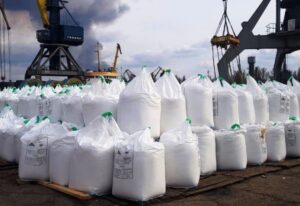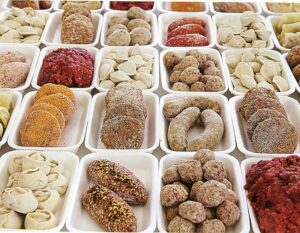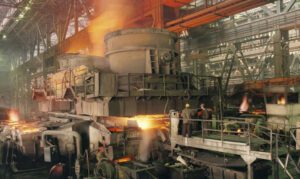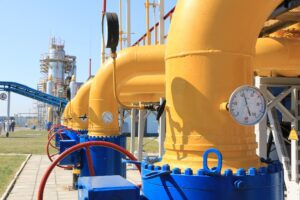
The production of cable and wire products in Ukraine in the first quarter of 2021 decreased by 8.2% (by weight of metal) compared to the same period in 2020, the Ukrelektrokabel association reported on its website on Monday.
“Due to quarantine restrictions, a rapid decrease in demand, an uncontrolled rise in prices for raw materials and other unfavorable factors, in the first quarter of 2021 the enterprises of the association and the cable industry of Ukraine showed a decline,” the association said.
According to the analysis of the activities of the member enterprises, the processing of copper decreased by 12.1%, PVC (polyvinyl chloride) compounds by 13.1%, polyethylene by 8.5%, and insulating varnishes by 25.2%.
A significant decrease in production was demonstrated, in particular, by self-supporting insulated and protected wires by 30.1%; power cables with voltage up to 1 kV by 23.5%; electrical wires for power units by 27.7%, and lighting cords and wires by 18.1%.
The production of wires for industrial blasting operations fell even more significantly by 66.2% and radio frequency cables by 55%.
In addition, Ukrelektrokabel informs, in the first quarter, TF Cable Ukraine LLC (Chernihiv), a manufacturer of cable and wire products for energy distribution networks, has completely ceased production and 25% of the personnel were laid off.
According to the Unified State Register of Legal Entities and Individual Entrepreneurs, TF Cable Ukraine LLC with a charter capital of UAH 125.6 million was registered in 2008, and 100% of its shares are owned by the Polish company Tele-Fonika Kable.
According to Ukrelektrokabel, the negative events also included the forced reduction of 60% of the personnel at Cable Factory LLC (Kamianets-Podilsky), which produces installation cables and wires, as well as 15% of the personnel at Odesa-based Twomen Cable Factory (production of telecommunication copper and fiber-optic cables).
According to the data on the association’s website, it unites 18 manufacturers of cable and wire products, including large ones: Odeskabel, Pivdencable (Yuzhcable) plants (Kharkiv) and others.

An investment project for the construction of a soda ash plant in the suburbs of Kramatorsk (Donetsk region) involves investments in the amount of $575 million, head of the Donetsk regional state administration Pavlo Kyrylenko said.
“We are ready to offer, with ready-made conceptual design solutions, a project for the construction of a plant for the production of soda ash […] earlier there were plants in Sloviansk and Lysychansk (Luhansk region), but the capacities have been lost, and another such plant is in Krasnoperekopsk in Crimea,” Kyrylenko said at the forum “UkraineInvest Talks: Dnipro” on Thursday, May 27.
According to him, this plant will solve the problem of import substitution and will allow talking about export.
According to the presentation of the investment project, the construction of a plant with a capacity of 600,000 tonnes per year is designed for three years, it is planned to create about 2,000 jobs there. The area of the land plot is 50 hectares in the village of Raihorodok, stocks of raw materials will provide for 100 years of work. It is assumed that the implementation of the project will allow the supply of soda ash for export and will provide an inflow of foreign currency to Ukraine in the amount of at least EUR 75 million.
The head of the region also presented a project idea for the production of paper from chalk, a model of which was developed by the regional state administration. According to the presentation of the project, its cost is $10 million, the capacity is 9,000 tonnes of paper per year, the implementation period is ten months with the creation of 100 jobs.
According to the authors of the project, chalk paper can be 10-15% cheaper than traditional types of paper, it can decompose completely under the influence of sunlight within 6-18 months. The project is assessed as promising for a dry and ecologically loaded region with forest plantations and numerous chalk deposits.
Kyrylenko said that these projects are well developed and realistic.

Khlibni Investytsii holding company has opened a new line for the production of frozen semi-finished goods from puff pastry at the Chanta Mount enterprise, which is part of it (Novi Petrivtsi village, Kyiv region).
According to the company’s website, investments in an automated production line with a capacity of up to 700 kg of frozen semi-finished products per hour amounted to EUR4.5 million, and the total investment in the construction and launch of the enterprise operating since 2019 – EUR15 million.
The company specified that finished products are supplied to the leading national chains of Ukraine and the largest regional distributors under the Chanta Mount brand, as well as for export.
As reported, in April 2021, the international law firm Integrites announced that Khlibni Investytsii had attracted a $ 3 million loan from Raiffeisen Bank International for the construction of this line to strengthen the holding’s position in the local market.
Chanta Mount is an automated facility with minimal human involvement in the workflow. The company specializes in the production of frozen bakery products for the Ukrainian market, and also produces baguettes, croissants, rye breads and a number of breads with original recipes.
As reported, Khlibni Investytsii LLC is one of the largest Ukrainian holdings for the production of bakery.

The Austrian HEAD Group has begun construction of a plant for the production of equipment for winter sports on the territory of the industrial park Winter Sport in Vinnytsia, the start of which was postponed a year ago due to the COVID-19 pandemic, the website of Vinnytsia City Council said.
At the same time, it is specified that the commissioning of the new plant, which will be one of the largest plants of the HEAD Group, is scheduled for 2023, it is planned to create at least 1,200 jobs.
As reported, the total investment in the project is EUR 80 million, the area of production facilities for the production of skis, ski boots and bindings is 43,000 square meters.
The total area of the industrial park Winter Sport, where the enterprise will be built, is 25 hectares.

Metallurgical plant Azovstal (Mariupol, Donetsk region), part of Metinvest Group, in January-April of this year increased the production of general rolled goods, according to recent data, by 6.8% compared to the same period last year, to 1.37 million tonnes.
A representative of the enterprise informed Interfax-Ukraine that during this period steel production increased by 7.1%, to 1.45 million tonnes, output of pig iron – by 6.2%, to 1.28 million tonnes.
In April, Azovstal produced about 370,000 tonnes of general rolled products, 400,000 tonnes of steel, and 340,000 tonnes of pig iron.
In 2020, Azovstal increased output of general rolled products by 2.7% compared to the previous year, to 3.9 million tonnes, steel by 4.5% – to 4.2 million tonnes, pig iron by 9.4% – to 3.8 million tonnes.
The company is part of Metinvest Group, the main shareholders of which are SCM Group (71.24%) and Smart-Holding (23.76%), jointly managing the company.
Metinvest Holding LLC is the management company of Metinvest Group.

At the beginning of April this year, Petrosannan Company – a joint operating company of NJSC Naftogaz Ukrainy and the Egyptian General Petroleum Corporation – performed hydraulic fracturing work on pilot wells in the concession area in the Western Desert of the Arab Republic of Egypt, thanks to which oil production increased more than 20%, or 600 barrels per day. According to a press release from the Integrated Communications Department of NJSC Naftogaz Ukrainy on Monday, provided that the achieved production volumes and current oil prices ($60 per barrel) are maintained, Naftogaz Group will thus receive additional income of $400,000 per month.
“Only the start of the current well stimulation campaign has allowed us to increase our oil production by 20%. We are planning to use this experience in the future, in particular, hydraulic fracturing of the wells, at other sites operated by Naftogaz Group in the Arab Republic of Egypt,” First Deputy Head of Naftogaz Serhiy Pereloma said.
Naftogaz Group implements hydrocarbon exploration and production projects in the Alam El Shawish East area in the Western Desert and South Wadi El Mahareeth and Wadi El Mahareeth areas in the Eastern Desert of Egypt.